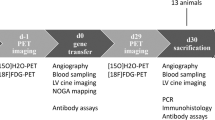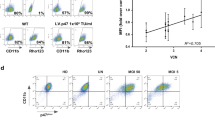Abstract
Interleukin-10 (IL-10) is a potent anti-inflammatory/immune cytokine and has received growing attention for its therapeutic potential. To aid therapeutic studies of IL-10 in vivo, a replication-deficient adenoviral vector expressing mouse IL-10 was constructed and characterized. The transgene protein IL-10 was shown to markedly inhibit endotoxin-induced tumor necrosis factor α (TNFα) production by mouse and rat macrophages in vitro. Intramuscular injection of this vector in mice resulted in efficient expression of transgene mRNA in the muscle and active release of IL-10 protein into the bloodstream. To investigate the therapeutic potential of IL-10 using this vector, endotoxemia was induced by intraperitoneal injection of a sublethal dose of endotoxin. Expression of TNFα and IL-6 mRNA in the lung, spleen and heart and the circulating levels of these cytokines markedly increased in endotoxemia. This endotoxin-induced TNFα and IL-6 up-regulation was however suppressed in mice expressing IL-10 after intramuscular gene transfer. While cytokine gene expression was inhibited to varying degrees in different organs, a maximal reduction was seen in the lung, thus also indicating the efficacy of systemic IL-10 gene product at multiple tissue sites. Finally, we provided evidence that only when present in abnormally high concentrations in the circulation following intraperitoneal gene delivery, IL-10 by itself had some toxic effects of transient nature, primarily manifested by acute phase reaction and hemostatic disturbance. Thus, our studies demonstrate the usefulness of adenoviral vectors for therapeutic applications of IL-10 in vivo.
This is a preview of subscription content, access via your institution
Access options
Subscribe to this journal
Receive 12 print issues and online access
$259.00 per year
only $21.58 per issue
Buy this article
- Purchase on Springer Link
- Instant access to full article PDF
Prices may be subject to local taxes which are calculated during checkout
Similar content being viewed by others
Author information
Authors and Affiliations
Rights and permissions
About this article
Cite this article
Xing, Z., Ohkawara, Y., Jordana, M. et al. Adenoviral vector-mediated interleukin-10 expression in vivo: intramuscular gene transfer inhibits cytokine responses in endotoxemia. Gene Ther 4, 140–149 (1997). https://doi.org/10.1038/sj.gt.3300371
Received:
Accepted:
Issue Date:
DOI: https://doi.org/10.1038/sj.gt.3300371



